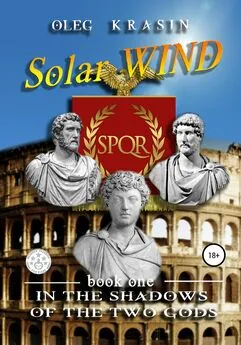Oleg Krasin - Solar Wind. Book one
- Название:Solar Wind. Book one
- Автор:
- Жанр:
- Издательство:неизвестно
- Год:2022
- ISBN:нет данных
- Рейтинг:
- Избранное:Добавить в избранное
-
Отзывы:
-
Ваша оценка:
Oleg Krasin - Solar Wind. Book one краткое содержание
MARCUS AURELIUS ANTONINUS
The emperor-philosopher, for a moment, thanks to him, the world was governed by the best and greatest man of his age.
Solar Wind. Book one - читать онлайн бесплатно ознакомительный отрывок
Интервал:
Закладка:
Now this face was different; Rufus lost his self-confidence and turned into a pathetic subject from whom everyone turned their backs.
The cave where Hadrian entered, accompanied by legats, retinue, and guards was remarkably quiet. Screams and scolding, the wails of the vanquished, black smoke in the sky and the smell of burning, all of it remained there, behind the walls. Here it was cool, the damp walls were unevenly illuminated by burning torches, but it was light enough to cover the whole cave.
The Emperor noticed several corpses of Jews lying on the side. In the far half-dark corner, apart from all, lay another body. He came closer. A retinue crowded behind; in a small space under the low arches was heard the noisy breathing of people.
On the stones lay a decapitated man in a dirty, blood-stained tunic. He was of short stature, raised fabric exposed short hairy legs with bare feet. There were no shoes on the former prince of Israel. Perhaps, the thieves have already visited and brought out everything that has turned under his arm.
“This is Varkoheba, great Caesar,” said Julius Severus, his voice sounding blankly under the arches of the cave.
The wind blew from behind, shadows swirling from the flame of torches.
“Who goes there?” Hadrian asked, but there was no answer.
Pushing the crowd, a tall centurion from the Fifth Macedonian Legion stepped forward. He led behind him a frail, ragged old man with gray side curlsand a disheveled beard. His hands were tied with a leather belt, which usually belted the tunic.
“Caesar, I have ordered to bring Akiva, a priest of the Jews. We've already talked about it,” Matenianus explained.
“Oh, yes, this rebel!”
The Emperor looked curiously at the face of a man exhausted by the long siege stained with mud and soot, and stingingly asked:
“What old man, your god, your Yahweh, has not helped you?”
But Akiva did not answer, he looked down under his feet, and his lips moved as if uttering the words of prayer. Or maybe he prayed to his god, whose name Jews could not say out loud. But Hadrian could speak because he was not a Jew.
Having lost interest in Akiva, Hadrian returned to the murdered Varkoheba. Looking closely, he saw something unusual on the rebel's body, where the neck was supposed to be, something was moving, it seemed that the dead man's shoulders were rising, as if the leader of the rebels had not yet died, and just put his head to the body as it comes to life. For a moment, Hadrian was terrified.
“Fire here!” he shouted.
The legionnaire ran up with a torch, and now everyone saw that the shoulders of Varkoheba were enveloped by a large viper, as light yellow, in dark spots, as the surrounding walls and stones under their feet.
“Look!” Severus exclaimed. “He is the messenger of their god. The Jewish god himself killed him, punishing him for deceit and treachery.”
The old man muttered something barely audible.
“What are you saying?” Hadrian turned to him and said, “Translate someone.”
One of the Syrians who guarding the emperor reported, “He says that God did not kill Varcoheba, he came for his soul, as a righteous man's soul, to place it in the treasury of the throne of glory.”
Hadrian frowned.
“Does God want to take this man’s soul to heaven? Then chop off the head of this snake! Rufus,” he found with his eyes among the retinue the figure of the viceroy, “Rufus, come here! You trust the great honor of defeating the messenger of the Jewish god.”
Before Rufus immediately parted, and he had to come forward. Near Varcoheba’s body, the governor stopped, hesitantly drew a sword from its scabbard, and began fussily poking at the head of the viper. The snake hissed menacingly, sliding from the body of the murdered, but the governor still could not get into her small flat head with a forked tongue. It seemed that horror shackled him, it was one thing to anger your gods, whom you can cajole by making a rich sacrifice to them, and another thing was a stranger, an unknown god. He, Tineius Rufus, did not know what sacrifices this Yahweh received. And would he accept from him?
“How long are you going to practice, Quintus? We're tired,” sneered Hadrian, who was amused by the squirming figure of the viceroy standing on half-bent legs.
The old man again muttered something in a stubborn, loud voice, and without waiting for the emperor's question, the Syrian translated it.
“He says that God will punish the one who will kill this snake.”
The remark of the recalcitrant rebel angered Hadrian, and he, a mighty, like the majestic monumental sculpture of Trajan, standing on the Forum, hung over the puny old man.
“I alone can punish here and no one else! Remember!”
In the cave there was silence, which was broken only by Rufus's grunt. Ceionius Commodus, who had been on the sidelines all this time, decided to intervene.
“Great Caesar, let me fight the Jewish messenger!”
Grim, with angrily sparkling eyes, Hadrian waved his hand and Commodus, coming up to the snake, deftly cut off her head. After this scene, the emperor addressed Akiva.
“You will be executed, old man, by a terrible execution.”
“Talking to God is not afraid of cruelty,” he replied detachedly.
“Proud! You don't have to talk to the gods, you have to ask the gods and listen to what they're talking about.”
Hadrian wrapped himself in his purple cloak, as if an unbearable, deadly cold pierced his body and went to the exit from the musty cave, to the hot sun, to the fresh air, even if it was saturated with the smoke of war, to those pleasant and elegant things that were waiting for him to return to Athens.
On the way out he stopped for a moment, saying without turning around.
“Send the legions to the Dead Sea, where the last rebels remain. And from this Jew, remove the skin from the living!”
Sabina's letter
“… You did a little reckless, in my opinion, rekindled the decrepit Servianus with conversations about the heir. What's the point? We've talked about it. Your successor should be Marcus Verissimus, as you call him…
In the meantime, Servianus goes to the homes of patricians and convinces that everything was decided. He is so pleased, this old peacock, that it becomes funny in the eyes of many when he solemnly starts praising you. It is as if the times of the Republic have come to life at the same time as Cato the Elder and Scipio…
By the way, his grandson Fusсus behaves defiantly. In the Circus, on horse races, he went up to Marcus and began to laugh at him, to claim that the emperor had turned his back on him, and left his graces to others. I think you'd be more likely to know about the conversations that go on around Fusсus. He bragged about making up your horoscope and supposedly showing the date of your death. I don't remember exactly, but it's heard that the moon in Aquarius will get into the quart to Saturn, which will be devastating for you. I don't understand anything about it, but you love horoscopes, and you probably know what you're talking about. So, Fusсus says you'll live sixty-one years and ten months, and death will be in November ides.” 47 47 November 13, 137
Hadrian at first just ran through the eyes of this letter, which seemed to him a set of empty city gossip. He was never particularly impressed with Sabina's mind, considering her an ordinary woman, undistinguished, though moderately educated. Despite the story with Antinous and the almost complete break, Sabina sometimes under the mood allowed herself to share impressions about the high life of the court in his absence. Now, apparently, she had such a desire.
He reread the letter more slowly. Gradually the meaning of the last lines began to reach him, and deaf fury took hold of his heart. Servianus and Fuscus. It was he who chose them among the rest, trusted them, and the confidence of the emperor was serious, they cannot be scattered as cheap copper asses 48 48 There's a copper coin in Rome.
on the morning exit to customers. Trust was a great jewel to be cherished more simply than diamonds from thieves.
Servianus and Fuscus were the last of his close relatives, no others left. But what a folly, to walk among the senators and spread about his imperial plans! What a stupid thing to do! No, they had not passed the test, and it did not matter who sent it down—gods or emperor!
In addition to the horoscope, there must be something that irrevocably convinces in the correctness of the final choice. For Hadrian, it was always a test to which he subjected his entourage, various tests, invented by himself. Some of them passed with ease, as for example, Marcus. A boy who did not see life and, seemingly, was much inferior to experienced Servianus and ambitious Fuscus. But he withstood them when he walked around Rome with the merry and embattled priests of the Salii, though he was very young, did not yield to carnal temptations when he, Hadrian, sent young slaves to him.
Of course, he still had a lot of work to do to achieve perfection like that of Hadrian himself. But he had the makings and had the main thing—effort, tact and restraint, as if Verissimus had already studied the fashionable philosophy of stoics. However, Marcus was still engaged with grammars, he did not even approach rhetoric.
Benedicta, this girl slave, confessed to Hadrian that Marcus still could not restrain himself at the very end of the love game, but it meant nothing. It was fixable. He would take him in hand and completely inseparably will him his own emotions.
And Servianus? And Fuscus? Oh Gods, how ordinary they are, as near as primitive as sharks among a pack of predatory sharks! But the rank of the great pontiff, princeps, Augustus, above all earthly, above the base passions, above the amphibian’s creatures? The Emperor was a living god who would cross into heaven with death and join the Assembly of other gods. And how could Fuscus become a god after all, after saying such words about him, Hadrian?
The Emperor felt his nose swell, held his hand over his arms above his upper lip, and saw that his fingers were painted red. Here again. All because he was worried, angry, he was bleeding again. When he subdued the rebellious Jews, shed rivers of their blood, he felt good, not a single bleed, not a single seizure. It was as if the gods, always hungry for sacrifice, needed any blood, and instead of his own, he gave them someone else's.
Now, after returning to Athens, his wife's letter was found, and everything turned out to be different. Taking a handkerchief and putting it to his nose, Hadrian lay down on the bed, threw his head.
He suddenly remembered Ceionius Commodus. Cheerful, executive, brave young man, though weak in intellect. How quickly and deftly he dealt with the snake, there, in the cave under Betar! And he was not afraid of this Jewish god with a funny name, not in the example of the former viceroy Tineius Rufus, who was shaking with fear. Among other things, Ceionius did not have such ambitions, burning the soul, as Fuscus, which was an undoubted plus. He would be quite a harmless ruler, which the Senate would undoubtedly like.
As for Marcus, Marcus Verissimus…
The emperor pondered. He would bide his time, because he had high hopes and, if the stars unfolded in the sky favorably, he would still be waiting for the purple cloak of the princeps. If not, he would become a good assistant to Ceionius Commodus, and then to his young son Lucius.
After reading the letter, Hadrian instructed the secretary Heliodorus to summon Ceionius from Rome.
“My dear Ceionius,” he said, approaching the guest, “I have decided to appoint you as consul for the following year, along with Sexton Vettulenus.”
Читать дальшеИнтервал:
Закладка:










